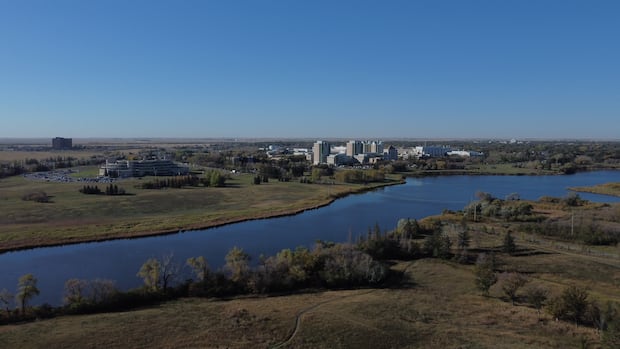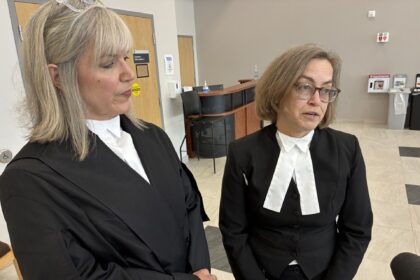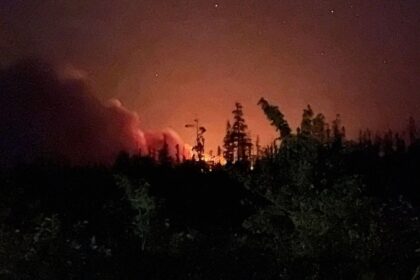SaskatchewanIn an unsigned statement, faculty members at First Nations University of Canada are expressing grave concerns over the direction of the institution, saying the gains made since its 2019 financial crisis have been “squandered” by bad stewardship.Board of governors is politicized again and university is back in debt, faculty sayLori Coolican · CBC News · Posted: Oct 07, 2025 5:43 PM EDT | Last Updated: October 7First Nations University of Canada and the University of Regina share a campus in Saskatchewan’s capital city. (Kirk Fraser/CBC)Faculty members at the First Nations University of Canada say they are not prepared to follow the board of governors’ instructions to keep quiet in the wake of revelations from an independent investigation into the institution’s president.”University leadership is expected to be ethical, financially responsible, student-centred and deeply accountable to the people and communities it serves. This is not the leadership style currently in place at FNUniv,” reads a statement signed by unnamed “concerned FNUniv faculty” and provided to CBC News.A representative of the group said they decided not to list their names on the statement because of concerns about possible retaliation.”We issue this statement out of a sense of responsibility. FNUniv was built to be a place of hope, resurgence and innovation,” the statement said. “We will not stand by as its future is jeopardized.”The university’s board of governors hired Deloitte Legal, an affiliate of accounting firm Deloitte LLP, to investigate more than two dozen allegations against university president Jacqueline Ottmann in 2023.This summer, CBC obtained a copy of the lengthy report. Its findings included that Ottmann engaged in nepotism and “empire building,” violated financial policies and disregarded oversight and control systems.The university’s most recent financial statement was completed by a firm other than Deloitte, which performed services for FNUniv for many years previously.WATCH | University president fired key whistleblower behind scathing review of her conduct: First Nations University president fired key whistleblower behind scathing review of her conductAn internal investigation found that FNUniv president Jacqueline Ottmann had engaged in nepotism, mismanagement and ’empire building’Ottmann fired the key whistleblower, Jason Wong, the university’s VP of finance and administration, while Deloitte was finalizing the report in mid-2023. In a preliminary draft of a separate report on Wong’s firing, the firm found, on a balance of probabilities, that his dismissal violated several university policies and “was at least in part, retaliatory.” Ottmann has not responded to requests for comment.A majority of the board of governors voted against firing her after receiving the Deloitte reports, and the board has issued statements saying it stands behind her.Two board members who were in favour of parting ways with Ottmann resigned their seats in 2024.An internal investigation found Jacqueline Ottmann, president of First Nations University of Canada, had engaged in nepotism, mismanagement and ‘empire building.’ (CBC)In a letter to faculty and staff after CBC reported on the matter last week, board chair Sherry Saevil said the university “is well governed and takes seriously our responsibility to the community, our students and our partners. It is not appropriate that we comment on confidential and personnel matters contained in reports obtained by the CBC.”The board “did our due diligence in assessing the management and leadership of the president and her team by commissioning these reports,” the message read. It reiterated that the board “has complete confidence in president Ottmann and we stand behind her.”The message also advised faculty on how to respond to questions about the situation.”If you receive questions from students, community members, or others, please refer them to the official board statement above. Do not speculate or provide additional comment,” it read.The statement issued by faculty members this week raises concerns about that.”We find this language alarming as it could be perceived as an attempt to silence staff and faculty, threatening our rights to academic freedom and open expression,” it reads.The Morning Edition – Sask11:43First Nations University president fired key whistleblower behind scathing review of her conductThe President of the First Nations University of Canada was the subject of conduct report where it found nepotism and overspending. CBC’s Geoff Leo brings us more on this story.Governance structure again an issueThe faculty statement calls for suspension of the university’s executive team, including Ottmann, the chief administrative officer and the vice-president of university relations, as well as dissolution of the current board of governors and their replacement with “a professional board constituted by members with diverse expertise, lived experience and national representation.”It also calls for “an end to political interference by the Federation of Sovereign Indigenous Nations in the governance and administration of the FNUniv.”The university’s governance and operational framework is set out in FSIN legislation. About 20 years ago, students and professors rang alarm bells over decisions made by the board, which was largely made up of politically appointed members. In 2009-10, both the provincial and federal governments withheld funding over board governance issues.In response, the FSIN changed the university’s legislation to forbid “any current politically elected or appointed representatives” on the board. It required a nine-member professional board of experts from fields like law, accounting and education.In 2022, however, the FSIN changed its legislation again. It now reads that “the board shall consist of five elected leaders and four non-elected members.”The statement from faculty members describes changes at the university since political appointments resumed.First Nations University of Canada’s main campus is in Regina. Its governance structure is laid out in Federation of Sovereign Indigenous Nations legislation. (Alexander Quon/CBC)”There has been a troubling exodus of FNUniv staff, including key staff in finance and administration,” it says.”The university currently has close to a $2-million deficit. In addition, we have not had stable academic leadership in nearly three years,” it reads. “Our kēhtē-ayak (elders) council, established in 2015 to prioritize and centre the knowledge of elders in our communities, has also been marginalized, and respected elders have been removed.”Staff and faculty worked hard for more than a decade to recover from the 2010 funding crisis and rebuild FNUniv’s reputation, the statement says.”We restored financial surpluses and good relations internally and externally, and saw a significant increase in student enrolments. Since the current president took over, those gains have been squandered away due to a lack of relational accountability and prudent financial management.”Federal responseIndigenous Services Canada “was not made aware” of the FSIN’s decision to change the composition of the university’s board, or of the findings of the Deloitte investigation, ISC spokesperson Maryéva Métellus said in an emailed response to a request for comment.”The department does not intervene in the governance of the First Nations University of Canada, which aligns with the principle of First Nations control of First Nations education,” she wrote. “In keeping with the terms and conditions of the post-secondary partnerships program, Indigenous Services Canada provides the First Nations University of Canada with up to $7 million a year for ongoing support.”As with all its post-secondary funding recipients, ISC will continue working with FNUniv “to ensure that its programs are delivered in accordance with its funding agreement,” Métellus wrote.FNUniv is a member of Universities Canada, a membership-based non-profit that advocates for universities at the federal level. A spokesperson for Universities Canada sent a brief statement in response to a request for comment.”We are aware of the news report. We have clear eligibility criteria for membership, and follow established processes to review any concerns,” it read.ABOUT THE AUTHORLori Coolican has been a reporter and editor in Western Canada since 1996.With files from Geoff Leo
Thursday, 5 Mar 2026
Canada – The Illusion
Search
Have an existing account?
Sign In
© 2022 Foxiz News Network. Ruby Design Company. All Rights Reserved.
You May also Like
- More News:
- history
- Standing Bear Network
- John Gonzalez
- ᐊᔭᐦᑊ ayahp — It happened
- Creation
- Beneath the Water
- Olympic gold medal
- Jim Thorpe
- type O blood
- the bringer of life
- Raven
- Wás’agi
- NoiseCat
- 'Sugarcane'
- The rivers still sing
- ᑲᓂᐸᐏᐟ ᒪᐢᑿ
- ᐅᑳᐤ okâw — We remember
- ᐊᓂᓈᐯᐃᐧᐣ aninâpêwin — Truth
- This is what it means to be human.
- Nokoma











